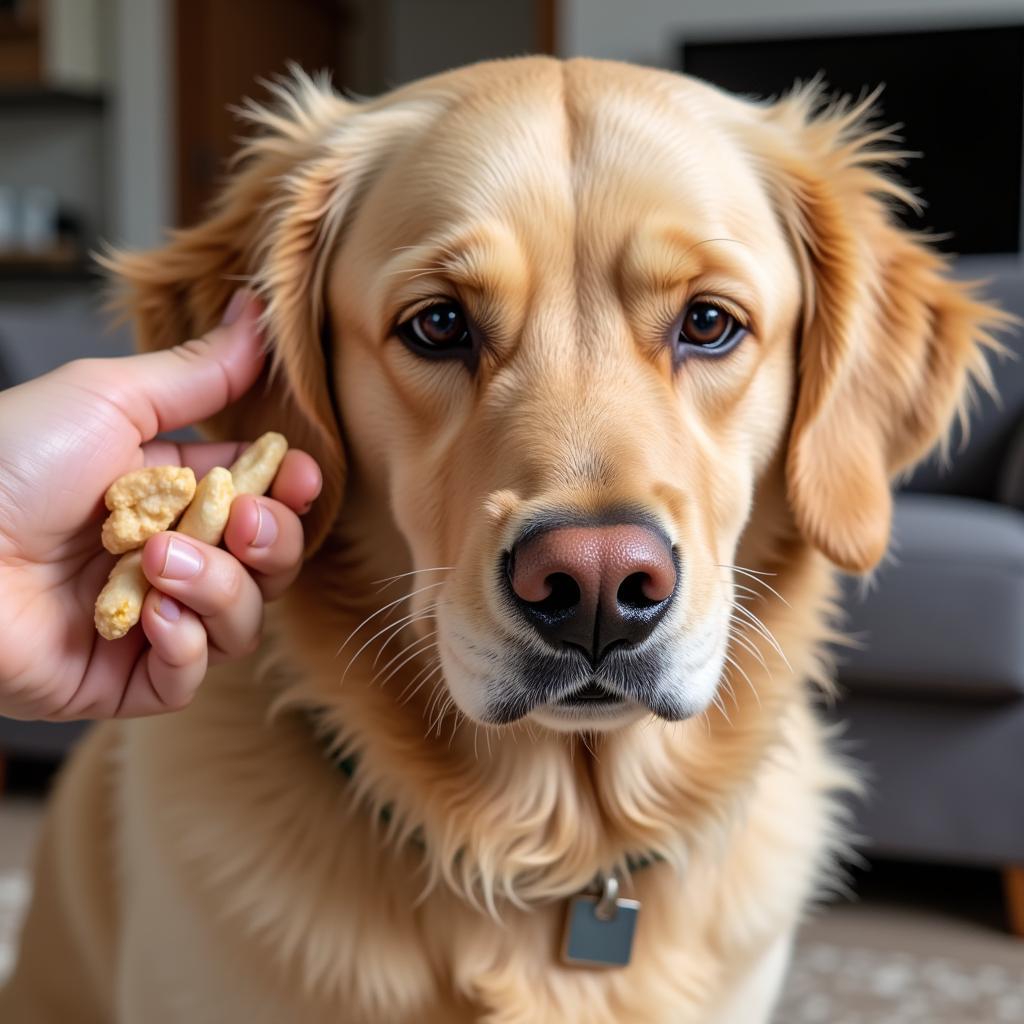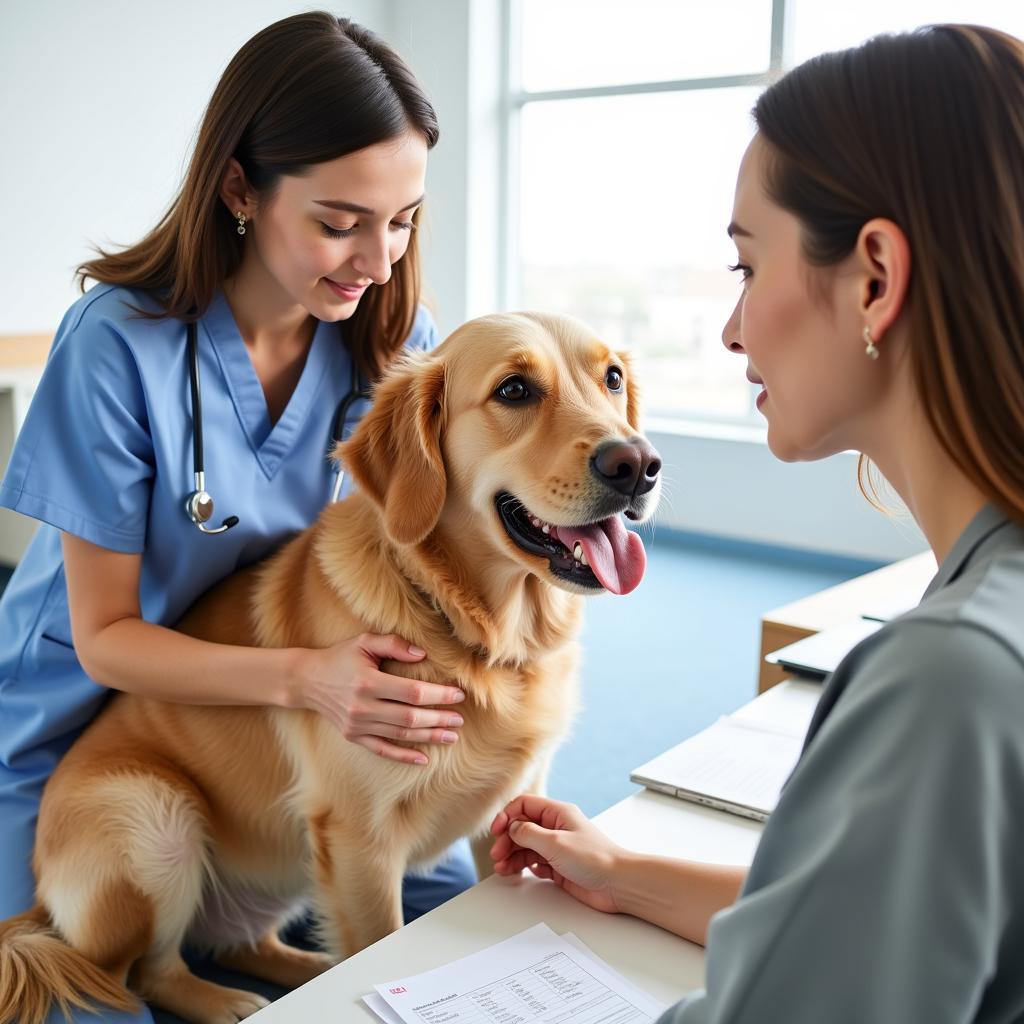Food intolerance in dogs can manifest in a variety of ways, from itchy skin and ear infections to digestive upset. A Food Intolerance Test For Dogs can be a valuable tool in identifying the culprit ingredients and helping your furry friend feel their best. This comprehensive guide will explore the different types of tests available, their benefits, and how to choose the right one for your canine companion.
Understanding Food Intolerance in Dogs
 Dog scratching its ear due to food intolerance
Dog scratching its ear due to food intolerance
Unlike a food allergy, which triggers an immediate immune response, food intolerance is a delayed reaction to certain ingredients. It can develop over time and may be caused by a dog’s inability to properly digest specific proteins, carbohydrates, or additives. Common culprits include beef, chicken, dairy, wheat, and corn. Identifying these trigger foods is crucial for managing your dog’s symptoms and improving their overall well-being. Do you suspect your dog has a food intolerance? Let’s delve into the world of food intolerance testing.
best food for labrador with allergies
Types of Food Intolerance Tests for Dogs
There are several types of food intolerance tests available for dogs, each with its own advantages and disadvantages. Understanding the differences can help you make an informed decision.
Elimination Diets
This method involves systematically removing suspected food allergens from your dog’s diet and then reintroducing them one at a time to observe any reactions. While effective, elimination diets can be time-consuming and require strict adherence.
Blood Tests
Blood tests analyze your dog’s blood for antibodies related to specific food ingredients. While convenient, these tests are sometimes considered less accurate than elimination diets and may not identify all intolerances.
Saliva Tests
Similar to blood tests, saliva tests analyze your dog’s saliva for antibodies. These tests are generally less invasive than blood tests but share similar limitations in terms of accuracy.
Hair Tests
Hair tests analyze a sample of your dog’s hair for reactions to various food ingredients. The scientific validity of hair testing for food intolerances is debated within the veterinary community.
Choosing the Right Food Intolerance Test for Dogs
 Veterinarian examining a dog and discussing food intolerance testing
Veterinarian examining a dog and discussing food intolerance testing
Selecting the right food intolerance test depends on several factors, including your dog’s symptoms, your budget, and your veterinarian’s recommendations. Consulting with your veterinarian is crucial to ensure the chosen test is appropriate for your dog’s specific needs.
What Does a Food Intolerance Test for Dogs Tell You?
A food intolerance test for dogs can pinpoint specific ingredients causing your dog discomfort. This information empowers you to make informed decisions about your dog’s diet, leading to a happier, healthier life for your furry friend.
best dog food for sensitive stomach vomiting
Interpreting the Results
Once you receive the test results, it’s essential to work with your veterinarian to develop a customized diet plan that eliminates the identified trigger foods. They can guide you on selecting appropriate alternative ingredients and ensuring your dog receives complete and balanced nutrition.
 A happy and healthy dog eating its food after taking a food intolerance test
A happy and healthy dog eating its food after taking a food intolerance test
Conclusion
A food intolerance test for dogs can be a valuable tool in managing your dog’s health and well-being. By identifying and eliminating trigger foods, you can help your canine companion live a more comfortable and symptom-free life. Remember to consult with your veterinarian to determine the best testing approach and develop a personalized dietary plan.
dog food for frenchie with sensitive stomach
FAQ
- How much does a food intolerance test for dogs cost? The cost varies depending on the type of test and the provider.
- Are food intolerance tests for dogs accurate? Accuracy can vary depending on the test method.
- How long does it take to get results from a food intolerance test for dogs? Processing time can range from a few days to several weeks.
- What are the common symptoms of food intolerance in dogs? Common symptoms include itchy skin, ear infections, and digestive upset.
- Can food intolerances develop over time? Yes, food intolerances can develop at any stage of a dog’s life.
- What should I do if I suspect my dog has a food intolerance? Consult your veterinarian.
- Are there any home remedies for food intolerance in dogs? Dietary changes are the primary treatment.
food for dogs with irritable bowel syndrome
For further information, explore our articles on specific dog breeds and dietary needs. We also have resources on managing various digestive issues in dogs.
Need further assistance? Please contact us at Phone Number: 02437655121, Email: minacones@gmail.com, or visit our address: 3PGH+8R9, ĐT70A, thôn Trung, Bắc Từ Liêm, Hà Nội, Việt Nam. Our customer service team is available 24/7.